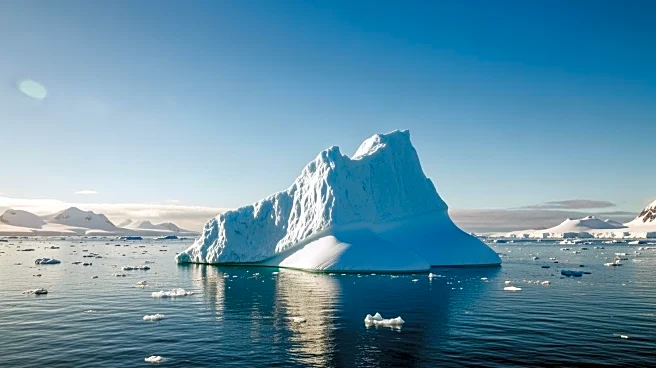What's Happening?
Researchers from the Alfred Wegener Institute have discovered that the Southern Ocean's ability to absorb carbon dioxide (CO2) has remained stable despite predictions of decline due to global warming.
The study, published in Nature Climate Change, reveals that fresh, low-salinity water near the surface has helped trap carbon in the deep ocean, slowing its return to the atmosphere. This natural carbon storage system is being altered by climate change, which could disrupt the delicate ocean layers. The Southern Ocean is crucial in capturing roughly 40% of human-produced CO2 emissions, making it a significant natural defense against global warming. The ocean's carbon sink functions through a complex circulation system where deep water rises to the surface, exchanges gases with the atmosphere, and sinks again, carrying absorbed CO2 back into the depths.
Why It's Important?
The Southern Ocean plays a vital role in mitigating climate change by absorbing a significant portion of human-produced CO2 emissions. The stability of this carbon sink is crucial for global climate regulation. However, the study indicates that climate change is altering ocean layers, potentially weakening this natural defense. If the stratification between water masses weakens, CO2-rich deep water could reach the surface and escape into the atmosphere, reducing the ocean's capacity to absorb new CO2 emissions. This could accelerate global warming, impacting ecosystems, weather patterns, and human societies worldwide. Understanding these dynamics is essential for predicting future climate scenarios and developing strategies to mitigate climate change impacts.
What's Next?
The study suggests that strengthening westerly winds, linked to human activity, are pushing deep water closer to the surface, raising the upper boundary of the deep water layer by about 40 meters since the 1990s. This movement increases the risk of mixing between water layers, potentially allowing stored CO2 to escape into the atmosphere. Continued monitoring and research are necessary to understand the long-term effects of these changes and to develop strategies to preserve the Southern Ocean's role as a carbon sink. Policymakers and scientists may need to consider interventions to maintain ocean stratification and prevent further disruption of this critical climate regulation system.
Beyond the Headlines
The findings highlight the complex interplay between oceanic processes and climate change, emphasizing the need for comprehensive climate models that account for deep ocean dynamics. The study underscores the importance of considering both surface and deep ocean interactions in climate predictions. It also raises ethical questions about human responsibility in altering natural systems and the potential need for geoengineering solutions to preserve oceanic carbon sinks. Long-term shifts in ocean stratification could have profound implications for marine biodiversity and global climate patterns, necessitating a reevaluation of current environmental policies.









